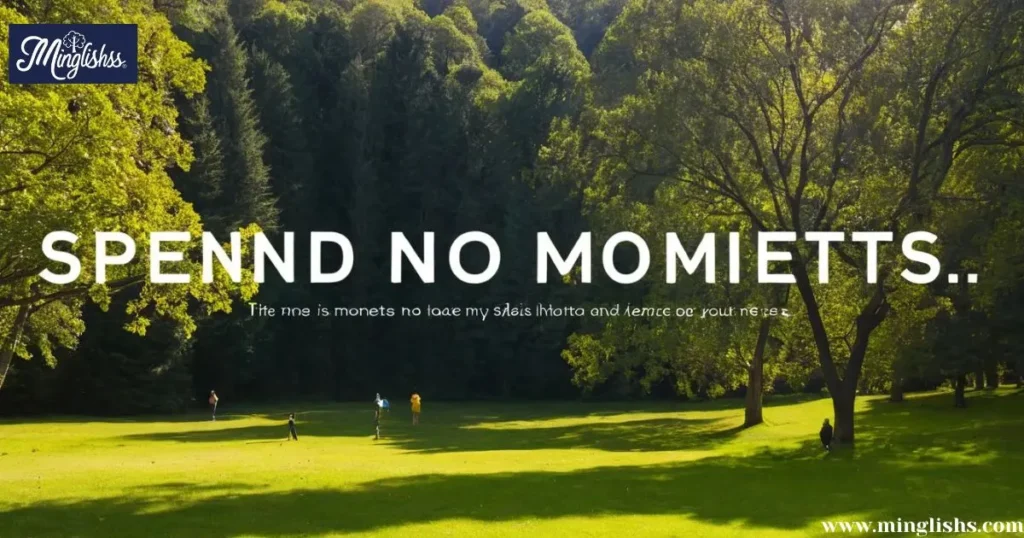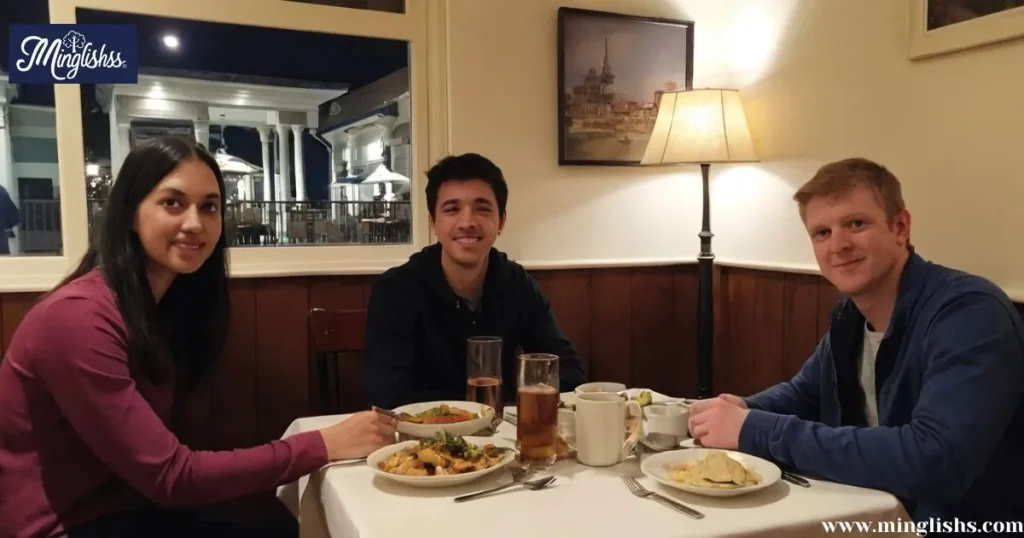““Time is the most precious resource we have; let’s make the most of it!”
In our fast-paced world, the way we express the concept of “spending time” can greatly influence how we connect with others and share our experiences. Whether you’re discussing leisure activities, work commitments, or time spent with loved ones, finding diverse ways to articulate this idea enriches our conversations.
It allows us to convey not just the act itself, but also the emotions and values associated with it. This blog will explore various expressions that can replace the phrase “spend time,” helping you diversify your vocabulary and improve your communication skills.
I encourage you to embrace this opportunity to enhance your language skills. Consider using these alternative phrases in your daily conversations, social media posts, or even in writing. Each phrase brings its own unique flavor, allowing you to express nuances in meaning.
By incorporating these variations, you’ll not only sound more fluent but also engage your listeners and readers on a deeper level. So let’s dive into the different ways to say “spend time” and discover how they can transform your communication.
This blog provides 35 different expressions, each accompanied by scenarios and explanations to help you understand their usage. From casual outings with friends to more formal engagements, these alternatives will allow you to articulate your thoughts more vividly. By the end, you’ll be equipped with a wealth of phrases that will make your conversations more engaging and relatable.
Alternative Expressions for “Spend Time”
1. Pass the time
Scenario: When Jake was waiting for his flight, he decided to pass the time by reading a novel.
Explanation: “Pass the time” suggests that you are engaged in an activity to fill a period of waiting or boredom. It often implies a casual or leisurely approach.

Additional Tip: Consider using this phrase when discussing activities that help you relax during unavoidable waits.
2. Hang out
Scenario: Sarah loves to hang out with her friends at the coffee shop every Saturday.
Explanation: “Hang out” is a casual term often used to describe spending time with friends or acquaintances in a relaxed manner. It’s informal and conveys a sense of enjoyment.
Additional Tip: Use “hang out” when discussing social gatherings or casual meet-ups.
3. Take time
Scenario: Emily decided to take time for herself and enjoy a quiet evening at home.
Explanation: “Take time” emphasizes the act of intentionally setting aside time for a specific purpose, whether it be for self-care or reflection.

Additional Tip: This phrase is useful for expressing the importance of prioritizing personal well-being.
4. Make time
Scenario: To maintain their friendship, Tom made it a priority to make time for his old college buddies.
Explanation: “Make time” indicates a deliberate effort to prioritize something or someone amidst a busy schedule. It conveys a sense of commitment.
Additional Tip: This expression is great for emphasizing dedication to relationships or activities you value.
5. Devote time
Scenario: Rachel decided to devote time to learning the guitar during the weekends.
Explanation: “Devote time” implies a focused and committed allocation of time toward a particular task or goal. It suggests seriousness and passion.

Additional Tip: Use this phrase when discussing serious commitments like hobbies or work projects.
6. Allocate time
Scenario: The manager needed to allocate time for team meetings and project updates.
Explanation: “Allocate time” is a more formal phrase often used in professional settings. It refers to distributing time for specific purposes or tasks.
Additional Tip: Use this phrase in business contexts where scheduling and time management are discussed.
7. Enjoy time
Scenario: The family gathered to enjoy time together during the holidays.
Explanation: “Enjoy time” emphasizes the pleasure derived from shared moments, highlighting the emotional aspect of spending time with others.
Additional Tip: This phrase is perfect for occasions involving friends and family.
8. Savor the moment
Scenario: After finishing her exam, Lisa took a moment to savor the moment of relief and accomplishment.
Explanation: “Savor the moment” suggests taking the time to appreciate an experience fully, often emphasizing mindfulness and gratitude.
Additional Tip: Use this phrase to encourage others to appreciate small victories and joyful moments.
9. Invest time
Scenario: Mark decided to invest time in building his professional network at conferences.
Explanation: “Invest time” implies that time is being spent strategically to achieve long-term benefits. It often relates to career growth or personal development.
Additional Tip: Use this expression when discussing efforts that require commitment for future gains.
Other Ways to Say “Personal Growth”
10. Spend quality time
Scenario: Mia and her parents made it a point to spend quality time together each week.
Explanation: “Spend quality time” emphasizes meaningful interactions and connections, often associated with family and close relationships.
Additional Tip: This phrase is ideal for discussions around deepening relationships.
11. Engage in
Scenario: During the workshop, participants were encouraged to engage in discussions about their experiences.
Explanation: “Engage in” suggests active participation in an activity, emphasizing involvement and interaction.
Additional Tip: This phrase is useful when discussing collaborative efforts or group activities.
12. Utilize time
Scenario: Alex tried to utilize his time efficiently by setting goals for each day.
Explanation: “Utilize time” conveys a sense of purpose in how one spends their time, often associated with productivity and effectiveness.
Additional Tip: Use this phrase when discussing productivity tips and time management strategies.
13. Bask in
Scenario: After finishing her project, Jenny decided to bask in the joy of her achievement for a while.
Explanation: “Bask in” implies taking time to enjoy the warmth of a positive experience, focusing on pleasure and satisfaction.
Additional Tip: Use this phrase when discussing moments of success or happiness.
14. Spend moments
Scenario: They cherished the time they could spend moments together, laughing and sharing stories.
Explanation: “Spend moments” highlights the fleeting nature of time, focusing on individual experiences that can be meaningful.

Additional Tip: This phrase can be used to express nostalgia or appreciation for past experiences.
15. Take a break
Scenario: To recharge, Jamie decided to take a break from work and enjoy a walk outside.
Explanation: “Take a break” emphasizes stepping away from responsibilities to refresh oneself. It’s often associated with self-care.
Additional Tip: This phrase is perfect for discussing the importance of rest in a busy lifestyle.
16. Relish the time
Scenario: On vacation, Tom and his family relish the time they spend exploring new places together.
Explanation: “Relish the time” conveys a deep appreciation for experiences, suggesting joy and satisfaction.

Additional Tip: Use this phrase when highlighting the enjoyment of special occasions.
17. Engross oneself
Scenario: Claire decided to engross herself in her favorite series over the weekend.
Explanation: “Engross oneself” indicates being fully absorbed in an activity, often suggesting deep focus and enjoyment.
Additional Tip: This phrase works well when discussing hobbies or interests that capture attention.
18. Take part
Scenario: The children were excited to take part in the community festival.
Explanation: “Take part” suggests participating in an event or activity, emphasizing inclusiveness and engagement.
Additional Tip: This phrase is ideal for discussing events that encourage community involvement.
19. Connect with
Scenario: During the reunion, they had the chance to connect with old friends they hadn’t seen in years.
Explanation: “Connect with” emphasizes building relationships and interactions with others. It highlights the social aspect of spending time.
Additional Tip: Use this phrase when discussing the importance of networking and friendship.
20. Catch up
Scenario: After years apart, Lisa and John finally found time to catch up over dinner.

Explanation: “Catch up” implies reestablishing contact and sharing updates about life events, focusing on communication and connection.
Additional Tip: This phrase is great for informal conversations about reconnecting with friends or family.
21. Devote oneself
Scenario: Max decided to devote himself to volunteering at the local shelter every weekend.
Explanation: “Devote oneself” indicates a strong commitment to an activity, emphasizing dedication and purpose.
Additional Tip: Use this phrase when discussing serious commitments to causes or organizations.
22. Participate in
Scenario: Samantha wanted to participate in the charity run to support a good cause.
Explanation: “Participate in” suggests actively joining an event or activity, emphasizing involvement and contribution.
Additional Tip: This phrase is useful in community and organizational contexts.
23. Share time
Scenario: The couple decided to share time by exploring new restaurants together.

Explanation: “Share time” emphasizes the mutual aspect of spending time, suggesting joint activities that foster connection.
Additional Tip: This phrase can be used to highlight cooperative experiences in relationships.
24. Make the most of
Scenario: David aimed to make the most of his summer vacation by traveling as much as possible.
Explanation: “Make the most of” implies maximizing opportunities and experiences, often focusing on enjoyment and fulfillment.
Additional Tip: This phrase is effective when discussing how to approach leisure time positively.
25. Immerse in
Scenario: Jenny decided to immerse herself in the culture while studying abroad.
Explanation: “Immerse in” suggests deeply engaging with an environment or activity, highlighting commitment and interest.
Additional Tip: Use this phrase when discussing cultural experiences or hobbies.
26. While away
Scenario: During the rainy afternoon, the kids would often while away the hours playing board games.
Explanation: “While away” suggests spending time leisurely or idly, often without a specific goal or purpose.
Additional Tip: This phrase is suitable for casual settings where relaxation is the focus.
27. Devote energy
Scenario: Rachel decided to devote energy to her fitness routine, making it a priority.
Explanation: “Devote energy” implies a focused allocation of effort and time to an activity, suggesting seriousness about goals.
Additional Tip: Use this phrase when discussing physical activities or self-improvement efforts.
28. Engage in leisure
Scenario: On weekends, Mark likes to engage in leisure activities like hiking and reading.
Explanation: “Engage in leisure” emphasizes participating in enjoyable, recreational activities, highlighting the importance of relaxation.
Additional Tip: This phrase is perfect for discussing hobbies and personal interests.
29. Dedicating time
Scenario: Lisa was dedicating time to improve her painting skills through online courses.

Explanation: “Dedicating time” suggests a serious commitment to mastering a skill or engaging in an activity.
Additional Tip: Use this phrase to convey commitment to personal growth or development.
30. Chill out
Scenario: After a long week, Alex just wanted to chill out at home with a good movie.
Explanation: “Chill out” is a casual expression that suggests relaxing or taking it easy, often with friends or alone.
Additional Tip: This phrase works well in informal contexts when discussing relaxation.
31. Indulge in
Scenario: Every Sunday, Emily likes to indulge in her favorite brunch spots with friends.
Explanation: “Indulge in” emphasizes treating oneself to enjoyable experiences, often with a sense of pleasure.
Additional Tip: Use this phrase when discussing self-care or enjoying special occasions.
32. Wander through
Scenario: While on vacation, the couple loved to wander through local markets and explore new cuisines.
Explanation: “Wander through” suggests a leisurely exploration of places, often highlighting a sense of curiosity.
Additional Tip: This phrase is great for discussing travel experiences and exploration.
33. Catch some time
Scenario: After a busy week, Sarah was eager to catch some time with her best friend to chat and unwind.
Explanation: “Catch some time” implies finding moments to reconnect and enjoy each other’s company, often in a casual manner.

Additional Tip: Use this phrase when scheduling informal meet-ups or social interactions.
34. Connect over
Scenario: The two colleagues decided to connect over lunch to discuss the project.
Explanation: “Connect over” emphasizes shared experiences, often in a social context, that foster discussion and interaction.
Additional Tip: This phrase works well for both casual and professional networking scenarios.
35. Take time out
Scenario: David decided to take time out from his busy schedule to focus on his mental health.
Explanation: “Take time out” implies stepping back from regular activities to focus on something important, often related to well-being.
Additional Tip: Use this phrase to emphasize the importance of self-care and personal reflection.
Pros and Cons of Using Alternative Phrases
Pros
- Variety: Using different expressions prevents monotony in language and keeps conversations engaging.
- Clarity: Some phrases may convey specific emotions or intentions better than others.
- Connection: Diverse vocabulary can help connect with different audiences, making conversations more relatable.
Cons
- Context Dependence: Some phrases may be too informal or specific for certain contexts, leading to miscommunication.
- Overcomplication: Using too many alternatives can confuse listeners, especially if they are not familiar with the expressions.
- Cultural Differences: Some phrases might not translate well across cultures, potentially leading to misunderstandings.
Conclusion:
Exploring various ways to say “spend time” not only enriches your vocabulary but also enhances your ability to connect with others. By integrating these expressions into your daily conversations, you can convey different nuances and emotions, making your communication more dynamic and engaging.
Remember time to consider the context in which you’re using these phrases, as this can greatly influence their impact. Embrace the power of language and the many ways it can express your experiences and feelings!
Answers to Key Question
1.Why should I use alternative phrases for “spend time”?
Using alternative phrases helps to enrich your vocabulary and enhances communication by allowing you to convey specific emotions or intentions more effectively. It can also make conversations more engaging and relatable, providing variety in your speech and writing.
2.Are there any situations where using these phrases might not be appropriate?
Yes, some phrases may be too informal or specific for certain contexts, such as professional settings or formal writing. It’s important to consider your audience and the situation to ensure that your language is appropriate and effective.
3.Can using too many alternative phrases lead to confusion?
Yes, using too many unfamiliar phrases in a single conversation can potentially confuse listeners, especially if they are not familiar with those expressions. It’s best to use varied language judiciously to maintain clarity.
4.How can I effectively incorporate these phrases into my conversations?
You can incorporate these phrases by practicing them in casual discussions, writing exercises, or even journaling. Pay attention to how they fit into different contexts, and gradually use them in conversations with friends or colleagues to build comfort and familiarity.
5.Are there cultural considerations when using these phrases?
Yes, some phrases may not translate well across different cultures or might have different connotations. Be mindful of your audience’s cultural background and ensure that the phrases you use resonate positively in their context.

Hi, I’m Ethan Matthews: I make English easy with my clear and simple teaching style. I love helping learners feel confident in every lesson.










